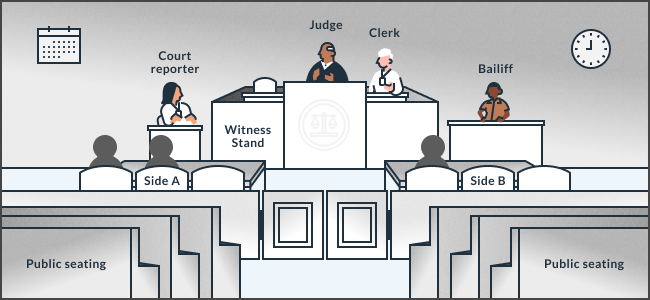What to expect in the courtroom
If you've never been to a court hearing before, it can be helpful to know some of the basics about what happens in a courtroom.
Don't be late
You could miss your turn if you’re late. If the court thinks you aren’t coming, the judge may decide your case without you.
-
Make plans to arrive early.
-
Think about traffic, where to park, or how to get there on public transportation.
-
Write down the phone number of the courtroom clerk. In case of an emergency, you can call and tell the clerk that you may be late.
Your court’s website (opens in a new tab) may have information about where to park and whether you’ll need money to park.
If you’re going to be late or will miss your court date:
-
Call the court. Talk to the clerk who works in the department that you've been ordered to go to (see form SV-109 for this information). If you can't reach the clerk, leave them a message.
-
If the other side has an attorney, call the attorney to let them know your situation.
When you get to the courtroom
The judge will probably have multiple cases scheduled for the same time as your case. You can wait for your turn in the public seating area at the back of the courtroom.

Follow courtroom rules
Rules are usually posted outside the courtroom, but here are some common rules:
-
Do not bring food or drinks
-
Turn off or silence your cell phone
-
Do not wear a hat or sunglasses on your head
When speaking:
-
Refer to the judge as “your honor” or Judge
-
Don’t interrupt anyone who is speaking
-
Wait until it's your turn to speak and let the judge know you want a chance to speak
When your case is called
-
You will take a seat at a table in the front
When the judge calls your case, you will sit at a table at the front of the courtroom. Someone, usually the bailiff or a clerk, will tell you which table to sit at.
-
The judge will ask who you are
The judge will ask you and the other side to say your names. Then, you may be asked to swear to tell the truth.
-
The judge will hear from both sides
You and the other side will have a chance to present your case. This is when evidence will be shared and witnesses will testify.
-
The judge will make a decision
Once all evidence has been presented, the judge will decide whether to grant a long-term restraining order. A long-term restraining order can last up to 3 years, and vary in length depending on the facts of each case.
What if the judge gave me another court date and I didn't get to present my case?
There are many reasons why the judge may have rescheduled your court date. This is called a continuance. Common reasons for a continuance include:
- You need more time to prepare for your case.
- 📌 If you ask for more time at your first hearing, the judge must grant your request.
- The judge will usually extend the temporary restraining order, if one was granted.
- The judge needs to give you another court date because they need more time to hear your case.
After the judge's decision
What's Next?
If the judge granted the restraining order, you may have steps to take.

